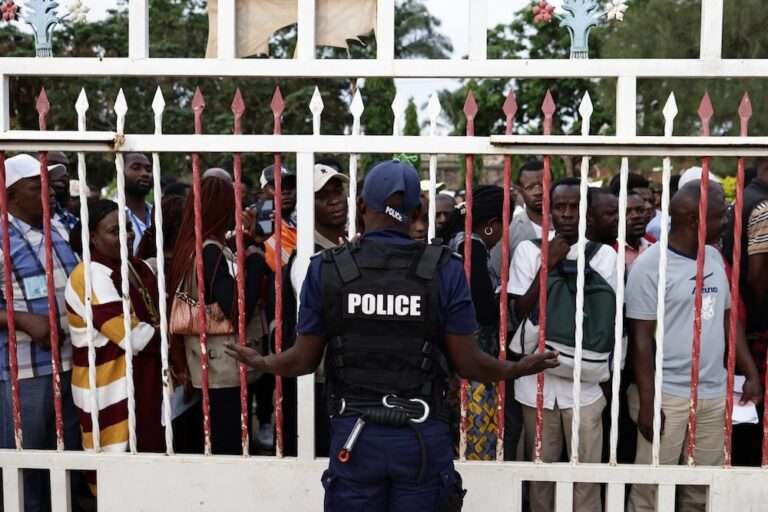(HRW/IFEX) – The following is a 3 September 1999 Human Rights Watch press release: ACADEMIC LEADERS CALL FOR RELEASE OF DETAINED CONGOLESE SCHOLAR (New York, September 3, 1999) – In an open letter to President Kabila released today, the Human Rights Watch Academic Freedom Committee called for the immediate release of Professor Kambaj wa Kambaji. […]
(HRW/IFEX) – The following is a 3 September 1999 Human Rights Watch press
release:
ACADEMIC LEADERS CALL FOR RELEASE OF DETAINED CONGOLESE SCHOLAR
(New York, September 3, 1999) – In an open letter to President Kabila
released today, the Human Rights Watch Academic Freedom Committee called for
the immediate release of Professor Kambaj wa Kambaji. Professor Kambaj, a
lecturer in sociolinguistics at the University of Lubumbashi, has been held
in government detention since July 29, reportedly for his critical analyses
of the use of ethnic hate language in political discourse in Katanga.
President Kabila is Katangese.
The letter also expresses grave concern for Professor Kambaj’s well-being,
noting reports that he has been subjected to inhumane and degrading
treatment while in detention and has been denied access to his doctor and
family.
“The arrest of Professor Kambaj is a sign of a deterioration in respect for
intellectual freedom in the Congo,” said Jonathan F. Fanton, who recently
stepped down as president of the New School University in New York. “It also
bodes ill for civil society.”
Fanton said that any long-term resolution of conflicts in the region would
require the establishment of strong, autonomous institutions that can rise
above the ethnic and political conflicts in the region. “The arrest of
Professor Kambaj is a step in the wrong direction,” said Fanton.
The letter was signed by Fanton on behalf of the committee and by Peter
Takirambudde, who heads the Africa Division at Human Rights Watch. In
addition to Mr. Fanton, the membership of the committee includes
internationally prominent academic leaders and scholars, including
presidents of Harvard University, Columbia University and over a dozen other
universities in the United States, and figures such as Lord Ralf Dahrendorf,
currently affiliated with the London School of Economics, Krzysztof
Michalski of the Institute for Human Sciences in Vienna, Ariel Dorfman of
Duke University, John Kenneth Galbraith of Harvard University, and Fang
Lizhi of the University of Arizona.
A copy of the letter follows:
September 3, 1999
Monsieur Le Président Laurent Désiré Kabila
Président de la République
Présidence de la République
Kinshasa – Ngaliema
République Démocratique du Congo
Monsieur Mwenze Kongolo
Ministre de la Justice
Monsieur Leonard She Okitondu
Ministre des Droits Humains
By Facsimile and Hand-delivered
Dear President Kabila, Minister Kongolo, and Minister Okitondu:
We are writing this open letter on behalf of the Human Rights Watch Academic
Freedom Committee to express the committee’s grave concern over the arrest
and continued detention of Professor Kambaj wa Kambaji, a lecturer in
sociolinguistics at the University of Lubumbashi.
According to our sources, Professor Kambaj initially was arrested at his
house on July 29 and was detained at the lockup of the National Intelligence
Agency (ANR) in Lubumbashi until his transfer, on August 19, to the capital
Kinshasa. We are especially concerned by reports that Professor Kambaj
repeatedly was tortured in detention in Lubumbashi and has been denied
access to his doctor and family, first in Lubumbashi and now in Kinshasa.
The professor was reportedly forced to board the plane which brought him to
Kinshasa barefoot and was ill-treated during the flight. We understand that
he is currently being detained at the External Department of the ANR in
Kinshasa.
The arrest and ill-treatment of Professor Kambaj appears directly related to
the government’s seizure from his home of student essays criticizing the use
of ethnic hate-speech in political discourse in Katanga, a theme which has
been prominent in Professor Kambaj’s own academic work. Because Professor
Kambaj’s analyses of political discourse and related activities appear to be
fully within the scope of his internationally guaranteed rights to freedom
of expression and association, we urge your government to release him
immediately.
As human rights activists, academic leaders, and independent scholars
committed to academic freedom and protection of the basic rights of
educators and students worldwide, it is not our intention to support or
dispute the opinions, ideas, or research findings of the scholars and
students whose cases we discuss. It is, however, a central feature of our
mandate to defend their right to express their views as citizens and to
study, research, teach, and publish without interference. Thanking you for
giving this matter your urgent attention. We would appreciate receiving a
response from your government as to what action was taken. We look forward
to your reply.
Sincerely,
Jonathan F. Fanton
Co-Chair, Human Rights Watch Academic Freedom Committee
Peter Takirambudde
Executive Director, Human Rights Watch, Africa Division


